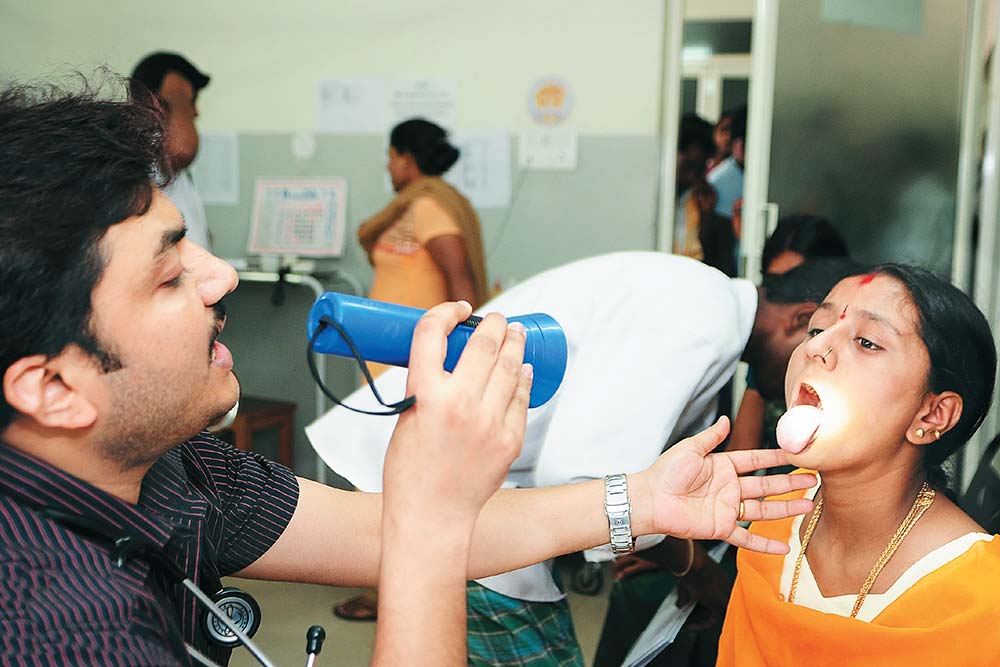Charu is a small-time farmer in Gundlupet, a small village about 60 km from Mysore. Last week, an accident at home left his 23-year-old son Ganesh fighting for survival with severe burns. Gundlupet only has primary health centres, which are not equipped to handle severe burn victims. So Charu rushed his son to Vaatsalya in Mysore, the hospital nearest to his village, and managed to have him treated in the nick of time. Earlier, he would have had travel all the way to Bengaluru, 200 km away.
For Charu and Ganesh, Vaatsalya made the difference between life and death. Since its inception in 2005, the Vaatsalya chain of hospitals has been making this difference many times over in the lives of the people of smaller towns and villages across the states of Karnataka and Andhra Pradesh — from saving newborn babies, seeing mothers through difficult pregnancies, and providing basic healthcare to which most of them had no access till then.
Vaatsalya was founded by two doctors, Ashwin Naik and Veerendra Hiremath, who grew up in Hubli, a town 420 km away from Bangalore. On his many visits to Hubli to see his parents, Naik was troubled by the lack of quality healthcare in smaller towns. Although nearly 70% of India’s population lives in these areas, it has access to only 20% of the healthcare facilities available in the country. It was a painful gap that was waiting to be addressed by Vaatsalya, which now has 15 hospitals — 10 in Karnataka (in places like Hubli, Bijapur, Mysore, Gulbarga and Shimoga) and five in Andhra Pradesh (Ongole and Anantapur). “People have gotten used to good quality healthcare by essentially travelling to the next biggest town,” says Naik, co-founder and CEO, Vaatsalya. “Now they want it in their own town.”
The chain either takes over existing hospitals from retiring doctors on long-term leases and spruces up the services by adding one or two specialties, or it rents vacant buildings, refurbishes and converts them into hospitals, and puts in a team of doctors. “It took us four years to figure out the business model,” says Naik. “Now there is more predictability on what kind of investments we have to make and how long it takes to break even.”
On average, a Vaatsalya hospital has around 50-70 beds. While the cost of setting up 70-bed hospital with similar services in a city would be around ₹10-11 crore, Vaatsalya is able to provide similar infrastructure at around #3.5 crore, mainly due to the difference in the cost of real estate. Vaatsalya is run like a low-cost airline — there are more general wards in the composition of hospital beds, and there are no LCD TVs or air conditioners in deluxe rooms.
It also lowered operating costs by centralising the procurement of medical equipment and consumables at the head office in Bengaluru. For instance, Vaatsalya charges ₹6,500-7,000 for a normal childbirth procedure whereas a comparable hospital in Bengaluru would charge around ₹12,000-18,000, and at a super-specialty hospital in the city, the charges could be anywhere upward of ₹50,000. According to the management, most of Vaastsalya’s hospitals achieve cash breakeven in 18-24 months.
Vaatsalya will add another 15 hospitals to its network in the next 18-24 months. Most of them will be in Karnataka and Andhra Pradesh; Maharashtra and Tamil Nadu may also have a couple. The healthcare brand has raised $17.5 million till date from venture capital funds such as Aavishkaar, Seedfund, Oasis and Aquarius India Fund to fund its expansion plans across India. “We will continue to support them,” says Bharati Jacob, founder partner, Seedfund India. “What has really impressed us is the execution ability of the team. Healthcare as an idea may not be new but execution is critical when you are developing a low-cost business model and they have done that outstandingly well.”
Currently, on average, Vaatsalya makes around ₹4-5 crore per hospital, giving it overall annual revenues of around #60 crore. Given its lower fees, operating margins, too, are lower at 12-15%, compared with the 18-19% margins enjoyed by similar hospitals in the cities. Naik says the country can handle 400 more hospitals like the Vaatsalya chain and that’s a lot of room to grow, not only for it but for others in the healthcare space as well.











